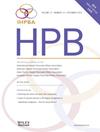Prognostic analysis of lymph node resection and liver resection for T1b and T2 gallbladder cancer: a multi-center retrospective study
IF 2.4
3区 医学
Q2 GASTROENTEROLOGY & HEPATOLOGY
引用次数: 0
Abstract
Background
Survival benefit of extended cholecystectomy including lymph node resection (LNR) and liver resection (LR) is still debating.
Methods
Patients pathologically diagnosed with T1b and T2 stage GBC in 6 medical centers from 2012 to 2022 were included and retrospectively analyzed. Clinical variables, including patient characteristics, overall survival (OS), disease-free survival (DFS), surgical approaches, and adjuvant treatments were collected. Propensity score-matching was performed to compare the survival outcomes.
Results
A total of 160 T1b/T2 GBC patients were included. 52 patients undergoing LNR were matched to 54 patients without LNR. After matching, LNR demonstrated significant survival benefit in OS (mOS 48.8 months vs not reached; p = 0.020) and DFS (mDFS 47.9 months vs 70.2 months; p = 0.038). Meanwhile, 61 patients undergoing LR were matched to 54 patients without LR. After matching, LR demonstrated no statistical difference in overall survival (mOS 68.2 months vs 78.5 months; p = 0.72) and disease-free survival (mDFS 67.1 months vs 42.6 months; p = 0.30).
Conclusions
Our results revealed that pathological T1b and T2 GBC patients benefit from radical cholecystectomy including lymph node resection and may not benefit from liver resection.
T1b和T2胆囊癌淋巴结切除和肝切除的预后分析:一项多中心回顾性研究。
背景:扩大胆囊切除术包括淋巴结切除(LNR)和肝切除(LR)的生存效益仍有争议。方法:选取2012 - 2022年6家医疗中心病理诊断为T1b和T2期GBC的患者进行回顾性分析。收集临床变量,包括患者特征、总生存期(OS)、无病生存期(DFS)、手术入路和辅助治疗。采用倾向评分匹配来比较生存结果。结果:共纳入160例T1b/T2 GBC患者。52例接受LNR的患者与54例未接受LNR的患者进行配对。匹配后,LNR在OS中显示出显著的生存获益(最大生存期48.8个月vs未达到;p = 0.020)和DFS (mDFS 47.9个月vs 70.2个月;p = 0.038)。同时,61例LR患者与54例未LR患者进行配对。配对后,LR显示总生存期无统计学差异(mOS 68.2个月vs 78.5个月;p = 0.72)和无病生存期(mDFS 67.1个月vs 42.6个月;p = 0.30)。结论:我们的研究结果显示病理性T1b和T2 GBC患者可以从包括淋巴结切除的根治性胆囊切除术中获益,但可能不能从肝切除术中获益。
本文章由计算机程序翻译,如有差异,请以英文原文为准。
求助全文
约1分钟内获得全文
求助全文
来源期刊

Hpb
GASTROENTEROLOGY & HEPATOLOGY-SURGERY
CiteScore
5.60
自引率
3.40%
发文量
244
审稿时长
57 days
期刊介绍:
HPB is an international forum for clinical, scientific and educational communication.
Twelve issues a year bring the reader leading articles, expert reviews, original articles, images, editorials, and reader correspondence encompassing all aspects of benign and malignant hepatobiliary disease and its management. HPB features relevant aspects of clinical and translational research and practice.
Specific areas of interest include HPB diseases encountered globally by clinical practitioners in this specialist field of gastrointestinal surgery. The journal addresses the challenges faced in the management of cancer involving the liver, biliary system and pancreas. While surgical oncology represents a large part of HPB practice, submission of manuscripts relating to liver and pancreas transplantation, the treatment of benign conditions such as acute and chronic pancreatitis, and those relating to hepatobiliary infection and inflammation are also welcomed. There will be a focus on developing a multidisciplinary approach to diagnosis and treatment with endoscopic and laparoscopic approaches, radiological interventions and surgical techniques being strongly represented. HPB welcomes submission of manuscripts in all these areas and in scientific focused research that has clear clinical relevance to HPB surgical practice.
HPB aims to help its readers - surgeons, physicians, radiologists and basic scientists - to develop their knowledge and practice. HPB will be of interest to specialists involved in the management of hepatobiliary and pancreatic disease however will also inform those working in related fields.
Abstracted and Indexed in:
MEDLINE®
EMBASE
PubMed
Science Citation Index Expanded
Academic Search (EBSCO)
HPB is owned by the International Hepato-Pancreato-Biliary Association (IHPBA) and is also the official Journal of the American Hepato-Pancreato-Biliary Association (AHPBA), the Asian-Pacific Hepato Pancreatic Biliary Association (A-PHPBA) and the European-African Hepato-Pancreatic Biliary Association (E-AHPBA).
 求助内容:
求助内容: 应助结果提醒方式:
应助结果提醒方式:


